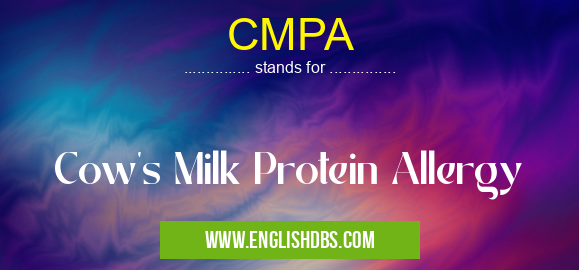What does CMPA mean in THERAPEUTICS
CMPA is an acronym that stands for Cow's Milk Protein Allergy. It is a common food allergy in infants and young children, affecting up to 3% of the population. CMPA occurs when the body's immune system reacts abnormally to proteins found in cow's milk, causing a range of symptoms.

CMPA meaning in Therapeutics in Medical
CMPA mostly used in an acronym Therapeutics in Category Medical that means Cow's Milk Protein Allergy
Shorthand: CMPA,
Full Form: Cow's Milk Protein Allergy
For more information of "Cow's Milk Protein Allergy", see the section below.
» Medical » Therapeutics
What does CMPA Stand for
CMPA is an abbreviation for:
- C: Cow's
- M: Milk
- P: Protein
- A: Allergy
Causes of CMPA
CMPA is caused by an immunological reaction to the proteins in cow's milk, primarily casein and whey. When an individual with CMPA consumes cow's milk or products containing cow's milk proteins, their immune system misidentifies these proteins as harmful and produces antibodies called immunoglobulin E (IgE). These antibodies bind to cells in the body, releasing chemicals such as histamine, which cause allergic symptoms.
Symptoms of CMPA
- Gastrointestinal symptoms: Diarrhea, vomiting, colic, gas, abdominal pain
- Skin symptoms: Eczema, hives, rash
- Respiratory symptoms: Wheezing, shortness of breath, nasal congestion
- Oral symptoms: Swollen lips, tongue, or throat
- Anaphylaxis: A rare but severe allergic reaction that can be life-threatening
Diagnosis of CMPA
CMPA can be diagnosed through a combination of:
- Patient history: Symptoms and dietary habits
- Physical examination: Inspecting for signs of allergic reactions
- Skin prick test: Involves pricking the skin with cow's milk proteins and observing for a reaction
- Blood test: Detects the presence of antibodies against cow's milk proteins
Management of CMPA
- Complete avoidance: The primary management strategy for CMPA is to strictly avoid all foods and products containing cow's milk proteins.
- Breastfeeding: Breast milk is the ideal nutrition for infants with CMPA, as it does not contain cow's milk proteins.
- Hypoallergenic formula: For infants who cannot be breastfed, a specially formulated hypoallergenic formula, such as extensively hydrolyzed or amino acid-based formula, can be used to provide adequate nutrition.
- Dietary modifications: Adults and older children with CMPA need to read food labels carefully to avoid hidden sources of cow's milk proteins, such as in baked goods, processed foods, and infant formula.
Essential Questions and Answers on Cow's Milk Protein Allergy in "MEDICAL»THERAPEUTICS"
What is Cow's Milk Protein Allergy (CMPA)?
Cow's Milk Protein Allergy (CMPA) is an immune response to proteins found in cow's milk. When an individual with CMPA consumes cow's milk products, their immune system attacks the proteins, leading to allergic reactions.
What are the symptoms of CMPA?
Symptoms of CMPA can vary depending on the individual, but common manifestations include digestive issues (e.g., vomiting, diarrhea), skin problems (e.g., eczema, hives), respiratory difficulties (e.g., wheezing, shortness of breath), and in severe cases, anaphylaxis.
How is CMPA diagnosed?
Diagnosis of CMPA typically involves a combination of methods, including:
- Patient history and symptoms assessment
- Allergy skin prick test or blood test
- Elimination diet and food challenge test
What are the treatment options for CMPA?
The primary treatment for CMPA is strict avoidance of all cow's milk products. This includes milk, cheese, yogurt, ice cream, and any foods containing cow's milk ingredients.
Can CMPA be outgrown?
In some cases, CMPA can be outgrown. Around 50% of children develop tolerance to cow's milk by age 3, and up to 80% by age 5. However, some individuals may continue to have CMPA throughout their lives.
What are alternative milk options for individuals with CMPA?
Suitable milk alternatives for individuals with CMPA include:
- Soy milk
- Almond milk
- Oat milk
- Rice milk
- Pea milk
Final Words: CMPA is a common food allergy that affects infants and young children. It is caused by an immune reaction to cow's milk proteins and can cause a range of symptoms. Avoiding all foods and products containing cow's milk proteins is crucial for managing CMPA. Breastfeeding and hypoallergenic formula are recommended for infants, while dietary modifications are necessary for older individuals.
CMPA also stands for: |
|
| All stands for CMPA |
